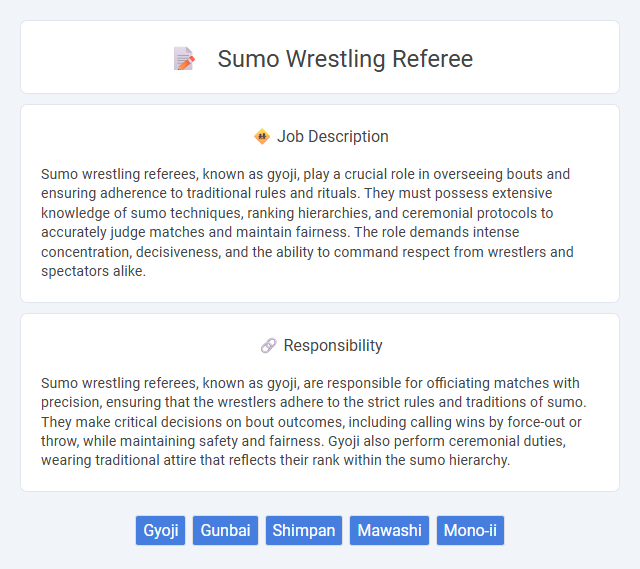
Sumo wrestling referees, known as gyoji, play a crucial role in overseeing bouts and ensuring adherence to traditional rules and rituals. They must possess extensive knowledge of sumo techniques, ranking hierarchies, and ceremonial protocols to accurately judge matches and maintain fairness. The role demands intense concentration, decisiveness, and the ability to command respect from wrestlers and spectators alike.
Sumo wrestling referees, known as gyoji, are likely to be suitable if they possess strong physical stamina and sharp mental focus, as the role demands constant movement and quick decision-making during intense bouts. Individuals with an aptitude for maintaining authority and attention to detail under pressure may probably thrive in this role. Those who struggle with stress management or lack knowledge of sumo rules might find the job challenging and less fitting for their skills.
Qualification
A Sumo wrestling referee, known as a gyoji, must possess extensive knowledge of sumo rules and rituals, often beginning their training in sumo stables from a young age. Mastery of precise hand gestures, vocal commands, and the ability to make split-second decisions is essential for maintaining the integrity of matches. Qualification involves a rigorous apprenticeship, progressing through junior ranks before attaining full referee status recognized by the Japan Sumo Association.
Responsibility
Sumo wrestling referees, known as gyoji, are responsible for officiating matches with precision, ensuring that the wrestlers adhere to the strict rules and traditions of sumo. They make critical decisions on bout outcomes, including calling wins by force-out or throw, while maintaining safety and fairness. Gyoji also perform ceremonial duties, wearing traditional attire that reflects their rank within the sumo hierarchy.
Benefit
Sumo wrestling referees likely enjoy a unique blend of cultural prestige and financial reward due to their critical role in traditional Japanese sports. The position often offers stable income supported by sponsorships and event revenues, coupled with opportunities for professional growth within the Sumo Association. Being a referee may also provide access to exclusive sporting events, enhancing both social status and career networking possibilities.
Challenge
Sumo wrestling referees likely face intense pressure to make accurate and unbiased decisions in a sport deeply rooted in tradition. The challenge of quickly interpreting complex moves and maintaining control during fast-paced bouts may require exceptional focus and expertise. Constant scrutiny from fans and wrestlers increases the probability of encountering high-stress situations on the dohyo.
Career Advancement
Sumo wrestling referees, known as gyoji, begin their careers at lower division matches and advance through rigorous training, experience, and strict evaluation by governing bodies like the Japan Sumo Association. Career advancement depends on expertise in match rules, decision accuracy, and maintaining wrestler respect, with top-level gyoji officiating high-profile tournaments such as honbasho. Achieving prestigious ranks such as tate-gyoji requires years of dedication, mastery of ceremonial duties, and authority within the sumo community.
Key Terms
Gyoji
Gyoji are the specialized referees in sumo wrestling who oversee matches, enforce rules, and ensure fair competition. They wear traditional attire and carry a wooden fan called a gunbai, which they use to signal decisions and direct wrestlers. Gyoji must undergo rigorous training and possess deep knowledge of sumo techniques and rituals to maintain authority in the highly ritualized sport.
Gunbai
A Sumo wrestling referee, known as a gyoji, uses a traditional wooden fan called a Gunbai to signal decisions and command the ring. The Gunbai is essential for communicating the winner, directing the match flow, and maintaining order during bouts in the dohyo. Expert gyoji training includes mastering Gunbai techniques, which are steeped in centuries-old rituals integral to sumo's cultural heritage.
Shimpan
Shimpan, or sumo referees, play a crucial role in professional sumo wrestling by overseeing bout fairness and enforcing rules during matches. They wear traditional attire and sit around the ring to judge closely contested decisions, calling fouls, and determining the winner in ambiguous situations. Shimpan must complete rigorous training and possess deep knowledge of sumo techniques, ensuring integrity and smooth operation of tournament bouts.
Mawashi
Sumo wrestling referees, known as gyoji, wear a traditional kimono and carry a fan used to signal decisions during matches. Their expertise in identifying precise movements, holds, and breaches involving the mawashi--the thick silk belt wrestlers wear--ensures fair judgment on grip legality and ring exits. Mastery of mawashi-related rules is critical for maintaining the sport's integrity and the accuracy of match outcomes.
Mono-ii
Mono-ii is a crucial aspect of sumo wrestling officiated by the gyoji and the shimpan, the referees and judges respectively. This discussion forum convenes immediately after a contentious bout to review the match outcome, ensuring the correct wrestler is declared the winner through collective agreement. Precision and deep understanding of sumo rules are vital for these referees to uphold tradition and maintain fairness in the sport.
 kuljobs.com
kuljobs.com